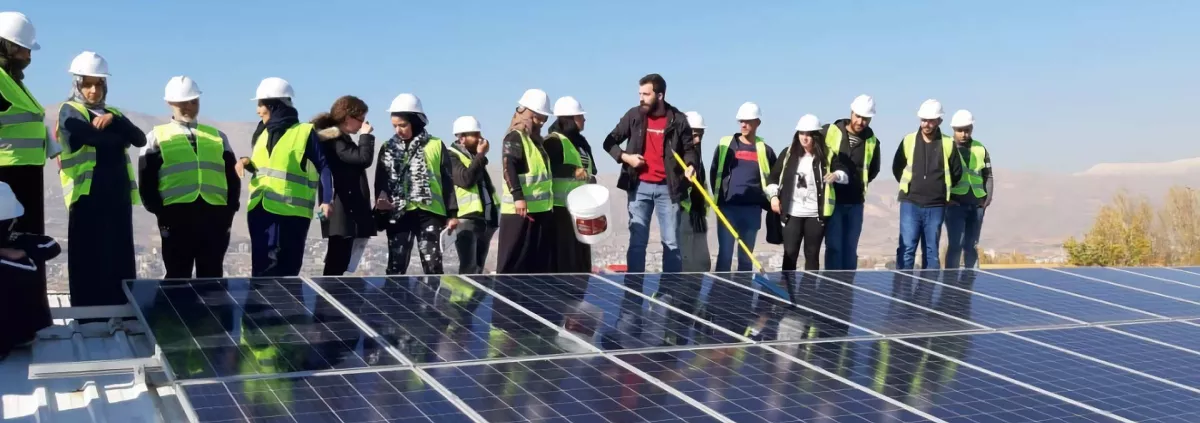Solar Energy for All in Qaraoun municipality in Lebanon
Overview
Amidst the energy crisis that Lebanon is facing, the municipality of Qaraoun has succeeded in overcoming major impediments to the provision of renewable energy to its residents. The renewable energy project ‘PV SOLAR SYSTEM- OUR FUTURE HOPE’ has addressed local needs for renewable energy, technical and vocational education and training, as well as community awarness raising. The project has adopted an inclusive approach that ensured gender-sensitivity throughout its components.

Background
The municipality of Qaraoun is a refugee-hosting small town in the west Beqaa’s valley in Lebanon, with about 10,000 inhabitants including 5,000 Lebanese and 4,800 Syrian refugees. The municipality belongs to Al Buhaira Union of Municipalities. As in the case with the majority of local authorities in the country, the tight municipal budget fails at covering the costs for operation and maintenance of municipal services projects. Promoting renewable energy is also challenging due to the problem of intermittency, lack of expertise and the political instability in Lebanon which ultimately affects the governance of the solar industry sector. As Qaraoun municipality’s budget suffered from the lack of government aid, seeking funding opportunities provided by the donor community was necessary.
The endorsed net-metering policy in Lebanon, adopted by national electricity company (EDL) in 2011 as part of the National Energy Efficiency Action Plan 2010 – 2015, marked a major step towards the promotion of solar energy in the country. Utilizing this policy, Qaraoun municipality embarked on a process to facilitate the installation of PV systems particularly in the industrial buildings. To ensure the community ownership of this energy transformation, public consultation and information campaign were key in the selection of priority projects to be implemented. As a result of this participatory process, two projects were selected: a waste water treatment plant and a recyclable waste sorting facility.

Objectives
- Reducing energy costs and GHG emissions by employing solar PV systems in the wastewater treatment plant and the recyclable waste sorting facility.
- Training and empowerment of young women and men to access the labour market of sustainable energy solutions. Women’s employment opportunities and participation in the management of the energy sector were particularly promoted in this male-dominated sector in an effort to achieve greater gender balance as well as equitable economic and social benefits.
- Community awareness raising on the importance of solar energy via education and training programs

Activities
- Fundraising from international donors, NGOs and establishing partnerships with municipalities to implement the two projects. The projects were funded by the GIZ and in a partnership with Traunstein district in Germany, and Engagement Global.
- Conducting training and education programs for young women and men to access the labor market in the field of sustainable solutions resulting
- Conducting community awareness raising campaigns and educational programs about solar energy to equip people with the relevant knowledge that ensures community ownership of renewable energy projects.
- Creating the Clean Energy, Education & Empowerment Program as an initiative to enhance collaboration between municipalities and to promote the leadership and participation of women in the clean energy transformation, resulting in a training site for the community.
- Launching the first all-women solar team in Lebanon in corporation with Rise2030: the team won the 2020 UN Global Climate Action Award under the category “Women for Results”.
Effects
- Reducing energy costs and GHG emissions by employing solar PV systems in municipal service facilities:
- the wastewater treatment plant resulted in annual reduction of energy consumption of 470MWh that mounts to 35,000 Euros in annual cost savings.
- the recyclable waste sorting facility resulted in reduction of annual energy consumption of 30MWh which mounts to 2500 Euros annual cost saving.
- The local community gained a better understanding of solar energy, solar farms, solar rooftops through classroom style training, study visits that were followed by assembly practice.
- Municipal service provision was improved and the economic burdens of the municipality were partially alleviated.
- Improved gender balance in the labor market of the solar energy sector
- Job creation via the Cash for Work programs. Renewable energy sector offers diverse opportunities along the value chain that require various skill sets.
- Skills of technicians and operators were improved regarding the operation and maintenance of the PV systems.

Conclusions
Besides overcoming the problem of electricity blackouts, solar energy presents a sustainable alternative to the commonly-used diesel generators in Lebanon. Scaling up renewables and rolling out the transition into renewable energy by transferring this good practice to new areas will thus have a positive impact. In addition to the direct economic and social benefits as well as to achieving energy security, environmental sustainability can be maintained by cutting down on GHG emissions.
Due to the success of these projects, the partnership with Traunstein district will be extended to implement other projects, such as the project of solar wastewater lifting station in Qaraoun (funded by the GIZ and in partnership with Traunstein), as well as installing PV systems to operate the solid waste management facility, and the main water pumping station in Kafraiya municipality in Al Buhaira Union. Furthermore, energy efficient street lighting will be installed via a project with Chemonics and funded by the USAID.

